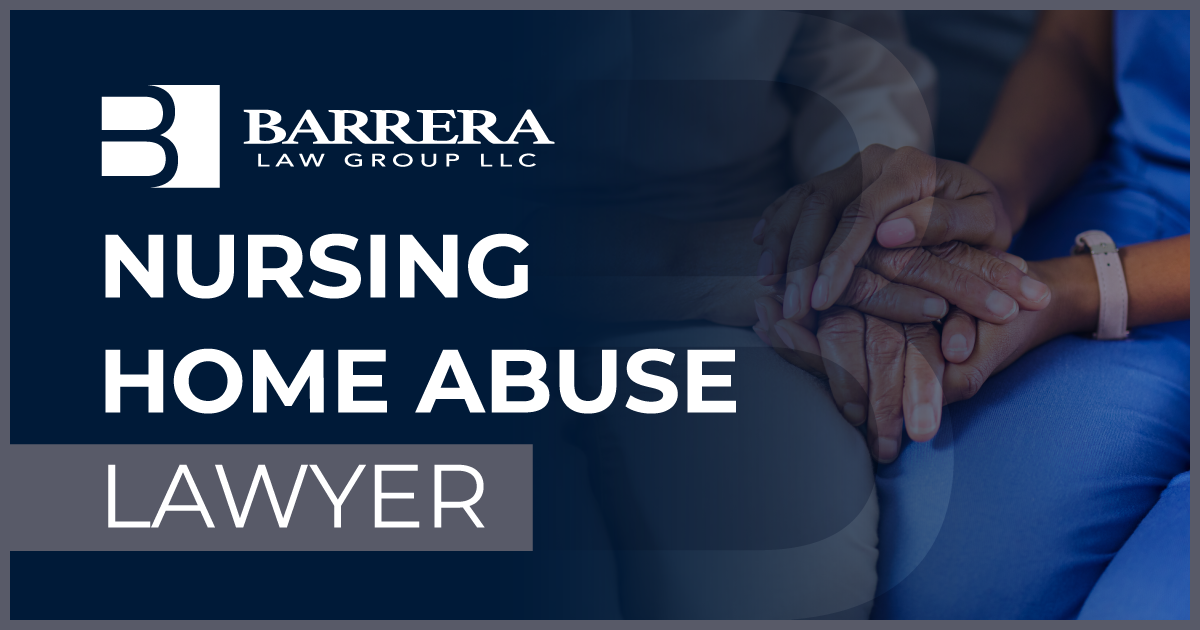Midland Nursing Home Abuse Attorney
There will come a time in all our lives when we need a little help getting around. When independent living is no longer a viable option, there are long-term care facilities that can provide around-the-clock support.
According to data collected from KFF, here in Texas, 85,351 residents live in 1,195 nursing homes across the state. While the vast majority of those residents are well cared for, there are instances where the care is substandard. When that becomes physically or emotionally damaging to a resident, it is time to discuss what is going on with a Midland nursing home abuse lawyer.
The attorneys at the Barrera Law Group LLC have years of experience handling these cases. We approach these incidents with compassionate care and legal acumen to support families seeking a fair remedy. Find out how we can assist with your suspected case of nursing home abuse.
The Types of Abuse in Nursing Homes
Before pursuing a nursing home abuse case, it is important to understand the scope of the complaint. That begins with classifying exactly which of the following abuse types your loved one might be experiencing.
Physical Abuse
The intentional physical abuse of an elderly resident is hard to fathom. This type of abuse can include the following:
- Hitting
- Striking
- Pinching
- Slapping
- Shaking
- Pushing
- Grabbing
- Handling in a rough manner
Physical abuse also includes excessive or unauthorized use of physical restraints or drugs used to control your behavior.
Verbal Abuse
Verbal abuse is a challenge to document because there is no physical evidence. There could be witnesses to the verbal abuse that includes yelling, swearing, belittling, intimidating, or threatening someone.
Sexual Abuse
This is the type of abuse that could rise to the level of a criminal complaint. It includes any unsolicited and non-consensual sexual contact. It can also involve forms of sexual harassment and sexual assault. Bottom line: There should be zero sexual contact between a resident and a staff member.
Emotional Abuse
When a staff member belittles, shames, or threatens a resident, that is a form of emotional abuse. Those threats can involve evicting the nursing home or compelling the resident to pay for favors.
Financial Abuse
Some nursing home residents are more vulnerable than others. That vulnerability can extend to financial matters where a staff member might steal the resident’s money by using debit or credit cards. They might also buy gifts for themselves using the residents’ funds.
Financial abuse could also come in the form of Medicare fraud. If the nursing home is ordering tests that your loved one doesn’t need, it could indicate they are filing Medicare claims for reimbursement.
Neglect
Neglect includes a resident being ignored or treated with indifference. That can mean the resident does not receive basic medical or personal care, such as personal hygiene, meals, drinks, and clean clothing.
Isolation
When a resident is involuntarily secluded or kept from meeting visitors, they are intentionally isolated. Not allowing those residents to access their phones or mail is another form of isolation.
Recognizing the Signs of Abuse
Texas Health and Human Services report that in 2020, Texas Adult Protective Services (APS) confirmed 52,506 cases of abuse of vulnerable adults. Even though your loved one is being cared for by staff, you remain their primary caregiver when it comes to advocating for what is best for them. You have to constantly be on the outlook the following signs of abuse:
- Frequent or unexplained injuries or illnesses
- Malnutrition or unexplained weight loss
- Bedsores
- Irritability, emotional disturbances, or a desire to withdraw from others
- Unusual or sudden behavioral changes
- Reluctance to speak in the presence of staff members
- Unsanitary living conditions
What to Do If You Suspect Abuse
If you visit your loved one, you might see one of the obvious signs of abuse. You could also see that abuse if you have access to their financial records. If you suspect your loved one is being abused, there are steps you need to take to remedy the situation.
Call 911
If you’re loved one is in immediate physical danger, you should call 911 for an intervention. This will also create an official record of the charge. That can become a vital piece of evidence in your claim.
Talk Through the Claim
Before filing a formal complaint, you must thoroughly discuss the situation with your loved one. This might be difficult because they could fear retribution. You need to assure them that the only way for the abuse to stop is if they share what happened.
Gather Evidence
If you are convinced that your loved one is being subjected to some form of abuse, you need to document anything that would be considered evidence. That can include photos and videos of any of the physical abuse, medical records, and notes on all the conversations you’ve had with staff members when you brought the abuse to their attention. It can also include any financial information, if applicable.
Understand Their Rights
Accusations of abuse will involve several government agencies. Understanding a nursing home’s rights, as stated by the Texas Long-Term Care Ombudsman, will help.
Discuss the Situation With the Administrator
You will need to bring the allegation of abuse to the attention of the nursing home administration. That discussion will mean sharing the allegations and the evidence you’ve collected. It might be helpful to begin this discussion with an email to document the time and response.
File a Formal Complaint
If you are dissatisfied with how the nursing home addresses your concerns, you can file a complaint to the Texas Health and Human Services agency or the state’s Attorney General Office. If you intend to take legal action against the facility with the help of a Midland nursing home abuse lawyer, your formal complaint can help solidify your claim.
It’s Time to Consult with a Midland Nursing Home Abuse Lawyer
There can be many reasons why a nursing home falls short of its standard of care. One of the most commonly cited reasons is understaffing. Because nursing homes are notorious for high staff turnover, there could be a gap in care because of a shortage of workers. That can lead to inconsistencies or hiring staff with improper training.
There has to be a strong management structure in place to deal with staffing issues. At the very least, they should inform the residents and their families about any staff hiring situation that can impact care.
Regardless of whether the neglect or abuse is intentional, it is still illegal. If you suspect your loved one is suffering from any kind of abuse, regardless of the severity, you should speak with the team at the Barrera Law Group LLC. We offer a free case evaluation to discuss your concerns, review your evidence, and advise you of the best way forward to protect your loved one and seek compensation for the damages. Find out how our Midland nursing home abuse lawyer can assist with these troubling claims.









